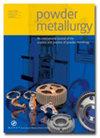混合元素粉末制备Fe-Cr-C钢烧结过程中的组织演变
IF 1.8
4区 材料科学
Q2 METALLURGY & METALLURGICAL ENGINEERING
引用次数: 0
摘要
本文章由计算机程序翻译,如有差异,请以英文原文为准。
Microstructural evolution during sintering of Fe-Cr-C steels prepared from admixed elemental powders
ABSTRACT In the upcoming years, a reduction in the use of critical elements, such as Ni and Cu, with unstable prices and high demand from the electromobility sector will become increasingly important for the PM-industry. Cr-alloyed sintered steels offer attractive properties at a moderate cost, but so far mostly Cr-prealloyed grades have been used. This work analyses the microstructural homogenisation process when Cr is introduced as admixed elemental powder. It is shown how – due to its high carbon affinity – Cr particles act as ‘internal carbon-getters’. There is an intermediate ‘heterogenization’ of the microstructure, i.e. the iron matrix is decarburised due to the formation of (Cr, Fe)-carbides. Final homogenisation depends on the formation of a transient liquid phase through the eutectic reaction between carbides and the iron matrix. Thus, the microstructure is not only sensitive to aspects such as sintering temperature or Cr-particle size but also to the heating rate and small variations in nominal carbon.
求助全文
通过发布文献求助,成功后即可免费获取论文全文。
去求助
来源期刊

Powder Metallurgy
工程技术-冶金工程
CiteScore
2.90
自引率
7.10%
发文量
30
审稿时长
3 months
期刊介绍:
Powder Metallurgy is an international journal publishing peer-reviewed original research on the science and practice of powder metallurgy and particulate technology. Coverage includes metallic particulate materials, PM tool materials, hard materials, composites, and novel powder based materials.
 求助内容:
求助内容: 应助结果提醒方式:
应助结果提醒方式:


